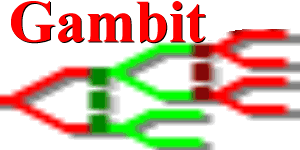 The package for computation in game theory
The package for computation in game theory

Gambit is an open-source collection of tools for doing computation in game theory. With Gambit, you can build, analyze, and explore game models.
Use Gambit's graphical interface to get intuition about simple games, or the command-line tools and Python extension to support your world-class research and practical applications.
Gambit is cross-platform: Get it for Microsoft Windows, Mac OS X, or Linux.
We are pleased to announce that The Alan Turing Institute has included support for Gambit development as part of its project, Automated analysis of strategic interactions .
The Turing-supported development that began in September 2023 will result in a new conceptual framework for expressing games, including games which are too large to represent explicitly, so that complex strategic interactions can be modelled with the assurance that the game model written down is the one intended by the user. This model will be implemented in Gambit, which will make Gambit suitable for use in supporting automated reasoning.
Through the project, Gambit will also incorporate recent developments in the algorithmic solution of games, including both exact and approximate equilibria, building upon and contributing to other cutting-edge libraries for scientific computing and mathematical programming.
Watch this space for specific details on the roadmap for Gambit in coming months, or follow the development on our GitHub repository.
Gambit 16.2.0, the current version of Gambit, was released on 2024-04-05.
Gambit 16.2.0 documentation · Download version 16.2.0 · Python package at PyPI
Gambit 16.1.1 was released on 2024-01-10.
Gambit 16.1.1 documentation · Download version 16.1.1 · Python package at PyPI
Gambit 16.0.2 documentation · Download version 16.0.2 · Python package at PyPI
Gambit is Free/Open Source software, released under the terms of the GNU General Public License.
We hope you will find Gambit useful for both teaching and research applications. If you do use Gambit in a class, or in a paper, we would like to hear about it. We are especially interested in finding out what you like about Gambit, and where you think improvements could be made.
If Gambit was useful to you in writing a scientific paper, we suggest a citation of the form:
Savani, Rahul and Turocy, Theodore L. (2023). Gambit: The package for computation in game theory, Version 16.1.0. http://www.gambit-project.org.
Replace the version number and year as appropriate if you use a different release.
The Gambit Project thanks the University of East Anglia for its current support of the project; the California Institute of Technology and the National Science Foundation for supporting the project from 1994-2001, and the 2011, 2012, and 2014 editions of the Google Summer of Code.
The director of the Gambit Project is Prof Dr Theodore Turocy.
To get the latest news on Gambit, Game Theory Explorer, and computation in game theory, like us on Facebook and follow us on Twitter (@thegambitproj).